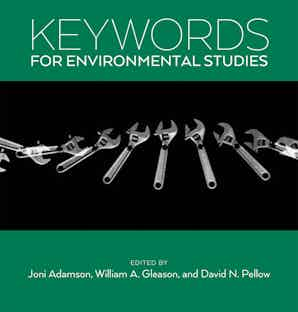Learn more about environmental justice and how it is defined:
 Keywords for Environmental Studies
by
Joni Adamson; William A. Gleason; David N. Pellow
A new vocabulary for Environmental Studies Understandings of "nature" have expanded and changed, but the word has not lost importance at any level of discourse: it continues to hold a key place in conversations surrounding thought, ethics, and aesthetics. Nowhere is this more evident than in the interdisciplinary field of environmental studies. Keywords for Environmental Studies analyzes the central terms and debates currently structuring the most exciting research in and across environmental studies, including the environmental humanities, environmental social sciences, sustainability sciences, and the sciences of nature. Sixty essays from humanists, social scientists, and scientists, each written about a single term, reveal the broad range of quantitative and qualitative approaches critical to the state of the field today. From "ecotourism" to "ecoterrorism," from "genome" to "species," this accessible volume illustrates the ways in which scholars are collaborating across disciplinary boundaries to reach shared understandings of key issues--such as extreme weather events or increasing global environmental inequities--in order to facilitate the pursuit of broad collective goals and actions. This book underscores the crucial realization that every discipline has a stake in the central environmental questions of our time, and that interdisciplinary conversations not only enhance, but are requisite to environmental studies today. Visit keywords.nyupress.org for online essays, teaching resources, and more.
Keywords for Environmental Studies
by
Joni Adamson; William A. Gleason; David N. Pellow
A new vocabulary for Environmental Studies Understandings of "nature" have expanded and changed, but the word has not lost importance at any level of discourse: it continues to hold a key place in conversations surrounding thought, ethics, and aesthetics. Nowhere is this more evident than in the interdisciplinary field of environmental studies. Keywords for Environmental Studies analyzes the central terms and debates currently structuring the most exciting research in and across environmental studies, including the environmental humanities, environmental social sciences, sustainability sciences, and the sciences of nature. Sixty essays from humanists, social scientists, and scientists, each written about a single term, reveal the broad range of quantitative and qualitative approaches critical to the state of the field today. From "ecotourism" to "ecoterrorism," from "genome" to "species," this accessible volume illustrates the ways in which scholars are collaborating across disciplinary boundaries to reach shared understandings of key issues--such as extreme weather events or increasing global environmental inequities--in order to facilitate the pursuit of broad collective goals and actions. This book underscores the crucial realization that every discipline has a stake in the central environmental questions of our time, and that interdisciplinary conversations not only enhance, but are requisite to environmental studies today. Visit keywords.nyupress.org for online essays, teaching resources, and more.
